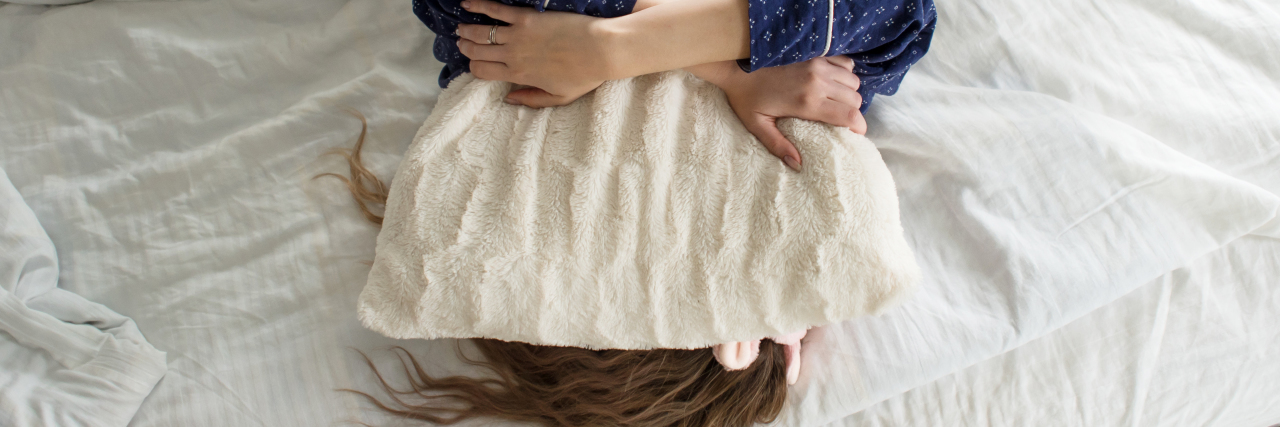What It's Like to Be Sick and Isolated in a Culture Obsessed With Personal Growth
If a stranger walked into my home, it wouldn’t take them long to figure out what kind of people live here. Yoga mats, a foam roller, and an exercise ball clutter the living room. A brewing jar of kombucha shares shelf space with an electric juicer and a Ninja Foodi. A glance at the bookshelf reveals “The Art of Loving,” “The Use of the Self,” “40 Days to Personal Revolution,” “Yoga Sequencing,” “The Bhagavad Gita,” “Embracing Your Inner Critic,” and “Wherever You Go, There You Are.” Two adorable felines stroll around (well actually, one—if there’s a stranger in the house, my shy cat will no doubt be hiding under the bed by now). My housemates and I embrace a lifestyle of orienting toward growth, taking personal responsibility, demanding happiness and comfort, and refusing to settle. I love this lifestyle. I am an idealist, and I am a classical pianist. I’ve spent a long time following my dream, caring about details, needing things to be precise and beautiful.
Even though I’m also an idealist about practicing kindness and compassion, I have been guilty more than once of silently judging unhappy or unhealthy people, assuming that they just weren’t “doing the work.”
That judgment tastes bitter now that I find myself looking at a future where “doing the work” can only improve my health but so much.
Our society values accumulating wealth, being busy, being beautiful, being fit, being young, procreating, being useful, being efficient, producing, creating, doing.
As I sit on my couch, contemplating that achieving many of these values may be a huge reach for me now, the idea of personal growth feels like a cruel joke.
My mind races to find some deeper reason for living that is still accessible to me before I slip into panic attack. Then the shy cat hops on my lap and looks at me the way my housemate wishes a man would look at her, and I melt a little.
Of course. The real thing that makes life worth living is consciously connecting with another. At first this feels better, because that’s something I will always be able to do, I tell myself. And then it hits me that this is actually the most devastating thing about acknowledging I have a chronic illness. Connection is now going to be even harder for me than it already is for average, healthy humans. Grieving the other things–career, independence, a material world identity, ice cream (damn you, inflammation)–is hard, but not as hard as the crushing isolation of realizing I have a chronic illness that nobody is going to be able to alleviate for me, and few people will even be able to comprehend.
Because my illness came on gradually, I didn’t acknowledge it until it forced me to miss out on opportunities I desperately wanted. I had become brilliant at explaining away my symptoms as normal, even to myself, so as to not let them isolate me. If they started getting worse, I would say this is within the realm of normal; you just have to work a little harder than most! Or this is just indicative that you’re way out of balance because of stress at work and you just need a good night’s sleep and to juice more. Or it’s just that everyone else is ignoring their bodies and all the suffering they’re enduring with their poor posture and diet and lack of exercise routine — and you’re the only one who is aware of things as they really are.
The feeling of isolation came when I realized I can no longer honestly believe that personal growth culture will fix my disease.
I can no longer tell myself that everyone else is going through what I’m going through.
Most other people aren’t working this hard, even the personal growth-oriented ones, and it may be really hard to find someone who really gets me or what reality is like for me. Connecting is going to be so much harder. Especially when symptoms keep me at home most of the time, or too tired or in pain to carry on a long conversation, or lacking the emotional and/or cognitive capacity to engage with anyone or anything but my next breath.
But it is also, simultaneously, so much easier. Because some of the pressure is off. I’ve stopped pretending, stopped trying to keep up in a race I have no shot at winning. I have already become authentic and vulnerable to a degree many people never will, because they simply have never had quite such a strong motivation to shed defense mechanisms that cost energy and create muscle tension. They may have never had to be so radically honest with themselves about hard truths, or about needing to ask for help. Pain is an urgent and compelling motivator to get real and figure out what matters. And now I can say to myself, speaking from experience and with love, pain sharpens you and gives you a direction. Pain is a gift; pain is your path. And the things you discover on that path, the depths of kindness and compassion you never thought you could develop for yourself but you do because you simply must, just to get by, make you more available to offer that kindness and compassion to others. And, just as important, they make you more available to receive it from others.
And for me, this is what it means to finally be open to life with pain and illness.

